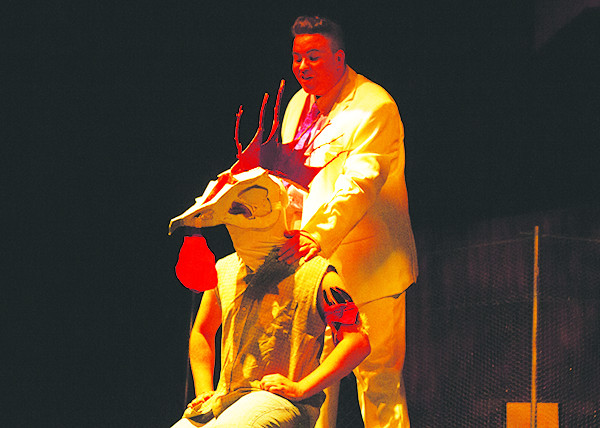Representation matters: ASU’s latest play tackles toxic masculinity through the LatinX perspective

ALAMOSA — Joaquin Rodriguez has played many roles during his time in the Adams State University theatre program.
But never has he felt “more seen” than with his current role of Gallo in the program’s latest production, “Roosters.”
The ASU senior said that feeling seen is important to him as a Hispanic actor.
“For me, personally, it is about being seen,” he said. “When you’re acting on stage and you play mostly white characters, there is a bit of this loss of yourself that happens. But in this play, the community all see my ethnicity and who I am.”
“Roosters” will hit the stage at 7:30 p.m. today at the San Luis Valley Bank Main Stage in ASU’s theatre building. Other showings are at 7:30 p.m. Sept. 30 and Oct. 1. There is a matinee scheduled for 2 p.m. Oct. 2.
The play follows Gallo, a man obsessed with cock fighting, who is released from prison for manslaughter in the opening of the play. His oldest son, Hector, has come in possession of Gallo’s prized rooster — the rooster he killed a man over. Hector does not wish to use the rooster for cock fight, but rather he wants to sell the bird to help support his family. This comes to the dismay of Gallo, causing family tensions that existed long before now.
The cast is largely Hispanic and LatinX. “Roosters” director and ASU assistant professor George McConnell said it was important for him to produce a play where his actors could play characters more authentic to their experiences and who are part of their cultures.
“I felt like, especially for a Hispanic-serving institute, we should be trying to make LatinX plays more of a regular occurrence — especially ones that focus on the LatinX experience,” McConnell said.
“We cast our students who are not white in roles. So, LatinX students like Joaquin have played ‘white roles.’ And they are like, ‘well this is written for a white person.’”
McConnell said a play like “Roosters” allows him to put students in roles reflective of LatinX and Hispanic cultures.
Rather than background characters, or playing lead roles written for white actors, his students can act and perform plays written and performed by people with similar experiences and backgrounds.
“It was really important to Joaquin and several students who came to me and said, ‘Hey, I’m not complaining, we do get opportunities, but it would be great to play someone who closely reflected who we are as actual people,’” McConnell said.
McConnell saw a production of “Roosters” before and thought it would be a perfect play to represent the actors’ perspectives and experiences.
Rodriguez said that being able to share that experience has added extra excitement in producing the play.
“The voices we choose to put on stage are important,” Rodriguez said. “We have a desire to put on shows that champion female voices and LatinX voices and Black voices; both in the writing and the onstage characters,” Rodriguez said. “That’s why so many of us in the theater are so excited about this show in particular.”
One of the main themes in the story is the ongoing struggle against toxic masculinity.
Gallo — and in many ways, Hector — represents the machismo and toxic masculinity that is the root cause of sexism, homophobia and a stigma for men’s mental health awareness and treatment.
The strong female voices in the play serve as the voice of reason. Ultimately, what McConnell describes as a “miracle” presents a strong voice that rails against the moral quandary. While the play doesn't provide a solution, McConnell said, it does spark conversation and give audiences much to think about.
“The most prominent theme is sort of cycles of toxic, male violence that are perpetuated through generations of family that men learn to be men from the men before them,” McConnell said. “A miracle happens at the end and it’s related and tied to the sort of idea of the sacred feminine.”
Rodriguez said the play uses cock fighting as a metaphor for toxic masculinity and male violence.
The tension between Hector and Gallo is highlighted by scenes in which actors portray the birds. The female characters take a stand against the chauvinistic and misogynistic ways of Gallo and Hector.
“Gallo is the not the nicest guy and he just sort of takes control of everything where maybe he shouldn’t,” Rodriguez said. “The play really deals with that by having the female characters speak up. They really say what everybody’s thinking and what everybody wants them to know, which is that they’re being stupid.”
“Roosters” also touches on the importance of family and owning where you’re from. That includes religion and the role it plays in LatinX culture.
McConnell said all the themes are tied together and play a role in the play's overall theme.
“All those lesser themes feed into the larger theme,” he said. “They’re all kind of connected.”
Tickets for the play are $10 for general admission, $9 for senior citizens and high school students and free to associated students and faculty.
For information or tickets, call the ASU box theater box office at 719-587-8499.



